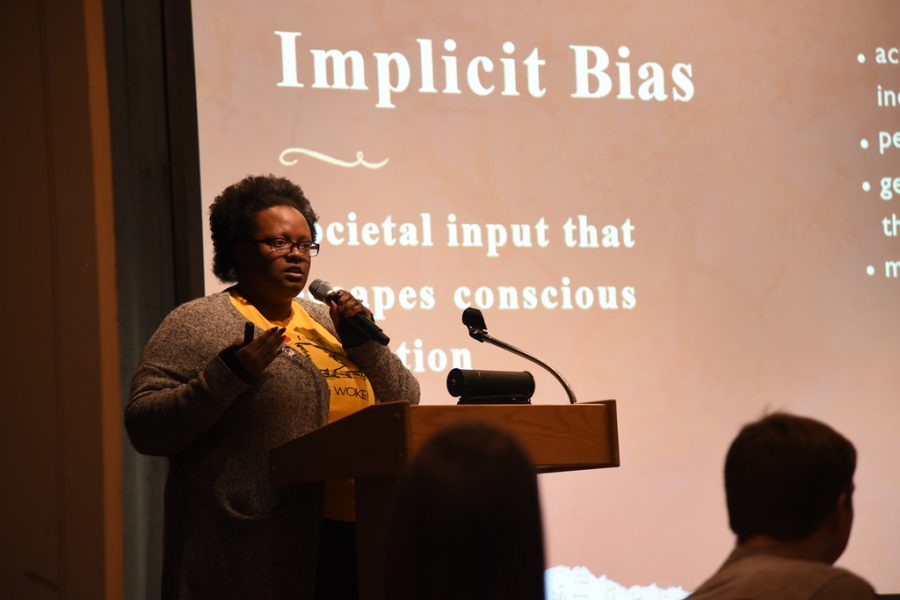Speak UP organizes panel event as an alternative option to Mac Donald lecture
November 22, 2019
On Nov. 14 from 7-8 p.m. Speak UP held the event “Scholars Speak Up: Discussing Social/Cultural Topics, Myths, and Misconceptions of Today” at Larison Dining Hall. Six panelists presented on “cultural myths and misconceptions surrounding social and cultural issues of today,” such as rape culture, trauma, racism, and economics.
The event was held at the same time as Heather Mac Donald’s talk at Bucknell Hall. “Scholars Speak Up” offered an academic perspective of many of the sensitive topics Mac Donald would address through a “Moderated Scholar Panel.”
Interpersonal Violence Prevention Coordinator and Speak UP supervisor Becca Geiger explained that the event was a reaction Mac Donald’s article “The Campus Rape Myth,” but developed into so much more. “I found out that we shouldn’t just focus on victim survivors because she said a lot of things that are harmful to groups that don’t just identify as victim-survivors . . . so we wanted to bring those additional perspectives,” Geiger said.
Larison Dining Hall was full by 7 p.m., and more chairs were brought out as people continued to shuffle in. “Just seeing the wide range of faculty and staff that went to the event was cool. It’s amazing, especially in times when it might seem like there’s not a lot of support, how much support there actually is,” Speak UP coordinator Lilly Shaner ’21 said.
Assistant Professor of Women’s & Gender Studies Erica Delsandro opened the event with an explanation of how rhetoric can fuel rape culture in tangible ways. Director of the Women’s Resource Center Kelsey Hicks talked about implicit biases and how these contribute to a myopic perspective — a narrow perspective that overlooks its implications.
Associate Professor of Economics Nina Banks then addressed Mac Donald’s claims about African Americans in poverty — namely, “the claim that black people are poor by non-marital births” — by explaining the trends in our economy that have informed and defined African Americans’ reality. Banks concluded with, “We live in a racialized, patriarchal society that expects men to be economic providers, penalizes women by paying them less, and lacks public support for caregiving activities.”
Heather Shnyder and Shannon Fisher, representatives of Transitions of PA, an organization in the Lewisburg area that provides a comprehensive support network for victims of domestic violence, spoke about the “traumatic victimization on individuals that have experienced sexual assault.”
Geiger also stressed how important it was to make the event accessible to all members of the University: “The point for us was to have as many co-sponsors as possible to say this isn’t a political issue, it’s not about left and right, so to speak, but about supporting students, supporting community members . . . we need to have these conversations and we need to be able to share this information . . . it’s about being a decent person to recognize and validate people’s experiences on this campus.” Co-sponsors included Women’s Resource Center, Interfraternity Council, Black Student Union, BSG Diversity Committee, Gender Sexuality Alliance, Ethiopian and Eritrean Students Association, South Asian Students Association and Korean Cultural Association.
“Our intention wasn’t to be political at all, but just that we want to be good people, and we want to make this community better,” Speak UP peer Sarah Loughran ’20 said.
After the panelists, the floor was opened up to all audience members to ask questions. One student said, “My experience at Bucknell — and a lot of the people I’ve been talking to — is not the most positive in the sense that there are a lot of systems in place that are actively working against students here. . . so what can students and faculty together do to combat these things? How can we work together to solve that, and what space is there for that?”
Her response was followed by a long silence. Interim Associate Provost for Diversity, Equity and Inclusion Nikki Young broke the silence. “Coalitioning is really important and also requires a constant recognition of the disparities in power that you bring up, rightfully. Some of the things we can do look like what happened tonight; we worked together from a variety of communities to create different spaces and allow ourselves to be heard, and seen, and witnessed, and recognized,” Young said.
The night ended with a self-care portion that invited students and faculty to practice self-care with others painting rocks, among other activities. Geiger says this part was “especially important for individuals who chose to go to Heather Mac Donald; to invite them into that space if they needed to debrief.”























Alexander Riley • Nov 22, 2019 at 5:47 pm
Heather Mac Donald’s Bucknell talk can be viewed here:
https://mediaspace.bucknell.edu/media/Heather+Mac+Donald+11+14+2019/1_20osz4db